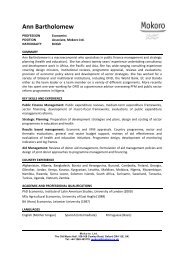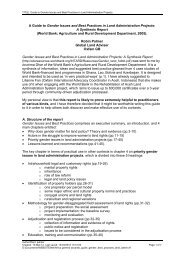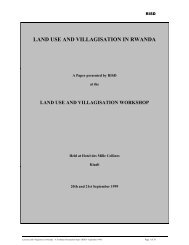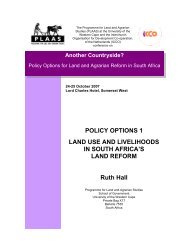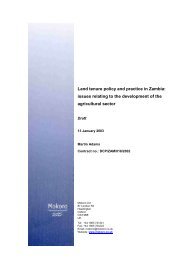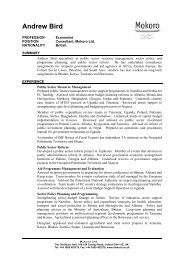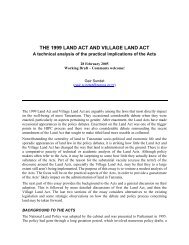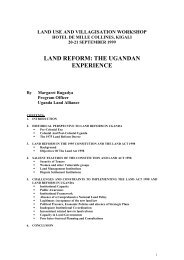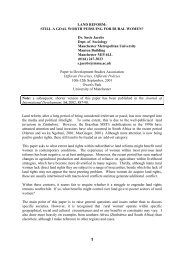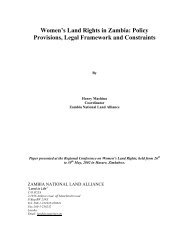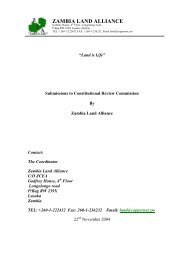Malawi National Land Policy - Mokoro
Malawi National Land Policy - Mokoro
Malawi National Land Policy - Mokoro
You also want an ePaper? Increase the reach of your titles
YUMPU automatically turns print PDFs into web optimized ePapers that Google loves.
Ministry of <strong>Land</strong>s Page 48<br />
household to holdings deemed adequate for subsistence and cash crop<br />
farming.<br />
(b) A strategy to encourage the resettlement of landless and land-short<br />
households in carefully selected areas throughout the country will be<br />
promoted.<br />
(c) Leaseholds scattered around the country that are considered in excess<br />
of established industry requirements, abandoned farms and estate holders<br />
who have defaulted will have their rights revoked and the land made<br />
available for redistribution to needy smallholder households.<br />
5.20 Strategy for <strong>Land</strong> Redistribution and Resettlement<br />
5.20.1. A policy to acquire land to resettle smallholders and landless farmers either by<br />
negotiation or purchase offers a chance to relieve land pressure and poverty in some of the<br />
most congested agricultural districts in the nation. Because the Ministry is the principal<br />
administrator of agricultural leaseholds in the country, it is relatively easy to identify<br />
expired and defaulting estates that could be repossessed. It is, therefore, unlikely that the<br />
Ministry will require huge sums of money to assemble land for redistribution. However, to<br />
immediately resettle 3,500 farming households (approximately 15 –20,000 people), the<br />
government has identified 14,000 hectares of land for this one time resettlement project,<br />
but it will need at least U$D 25 million to accomplish the task.<br />
5.21 Pilot Project To Refine Resettlement Procedures<br />
5.21.1 In order to undertake any systematic redistribution and resettlement policy, the Ministry<br />
will need technical assistance and funding support to develop and refine procedures for mass<br />
resettlement. A previous feasibility (1998) study for a resettlement project envisioned by the<br />
government had suggested establishing a revolving fund to finance the acquisition of land, the<br />
physical relocation of settlers and issuing of land and production loans to the settlers. The<br />
government would, in addition to its own contribution, solicit international assistance to<br />
underwrite this project in the immediate future.<br />
5.22 <strong>Land</strong> Resettlement and Social Development Board<br />
5.22.1 In a civil and democratic society that abides by the principles of equity and human<br />
rights, government cannot force people to relocate to any particular location without their<br />
consent. Individuals and households readiness to resettle in a different traditional area, district<br />
or region is a matter of personal choice. Attributes worthy of consideration for policy purposes<br />
include a person’s age, marital status, level of education and ethnicity. The potential disruption<br />
of social, cultural and economic existence may be traumatic enough to make the prospect of<br />
relocation untenable to some, and the prospect of leaving valuable immovable property is<br />
always a cause for resisting relocation. Last but not the least, every resettlement program must<br />
address the question of how much will respondents demand to be successfully resettled.<br />
6.0 LAND USE PLANNING AND DEVELOPMENT<br />
6.1 <strong>Land</strong> Use Planning and Development Controls<br />
http://www.malawi.gov.mw/lands/landpol.htm 29/03/2005 15:23:13



